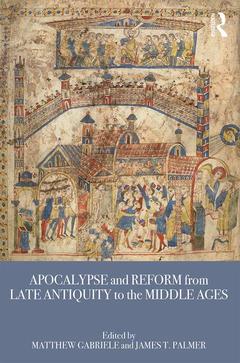Apocalypse and Reform from Late Antiquity to the Middle Ages
Coordonnateurs : Gabriele Matthew, Palmer James T.

Apocalypse and Reform from Late Antiquity to the Middle Ages provides a range of perspectives on what reformist apocalypticism meant for the formation of Medieval Europe, from the Fall of Rome to the twelfth century. It explores and challenges accepted narratives about both the development of apocalyptic thought and the way it intersected with cultures of reform to influence major transformations in the medieval world.
Bringing together a wealth of knowledge from academics in Britain, Europe and the USA this book offers the latest scholarship in apocalypse studies. It consolidates a paradigm shift, away from seeing apocalypse as a radical force for a suppressed minority, and towards a fuller understanding of apocalypse as a mainstream cultural force in history. Together, the chapters and case studies capture and contextualise the variety of ideas present across Europe in the Middle Ages and set out points for further comparative study of apocalypse across time and space.
Offering new perspectives on what ideas of ?reform? and ?apocalypse? meant in Medieval Europe, Apocalypse and Reform from Late Antiquity to the Middle Ages provides students with the ideal introduction to the study of apocalypse during this period.
Introduction; Chapter 1: "The Chronicle of Hydatius: a historical guidebook to the last days of the Western Roman Empire"; Chapter 2: "To be found prepared: eschatology and reform rhetoric ca. 570–ca. 640"; Chapter 3: "The final countdown and the reform of the liturgical calendar in the early Middle Ages"; Chapter 4: "Apocalypse and reform in Bede’s De die iudicii"; Chapter 5: "Creating futures through the lens of revelation in the rhetoric of the Carolingian Reform ca. 750 to ca. 900"; Chapter 6: "Eschatology and reform in early Irish law: the evidence of Sunday legislation"; Chapter 7: "Apocalypse, eschatology and the interim in England and Byzantium in the tenth and eleventh centuries"; Chapter 8: "Apocalypticism and the rhetoric of reform in Italy around the year 1000"; Chapter 9: "This time. Maybe this time. Biblical commentary, monastic historiography, and Lost Cause-ism at the turn of the first millennium"; Chapter 10: "Against the silence: twelfth-century Augustinian reformers confront apocalypse"; Chapter 11: Afterword
Matthew Gabriele is Associate Professor and Coordinator of Medieval & Early Modern Studies in the Department of Religion and Culture at Virginia Tech, USA. His previous publications include An Empire of Memory: The Legend of Charlemagne, the Franks, and Jerusalem before the First Crusade (2011), The Legend of Charlemagne in the Middle Ages: Power, Faith, and Crusade (2008) and Where Heaven and Earth Meet: Essays on Medieval Europe in Honor of Daniel F. Callahan (2014).
James T. Palmer is Reader in Medieval History at St Andrews, UK. His previous publications include The Apocalypse in the Early Middle Ages (2014) and Anglo-Saxons in a Frankish World 690–900 (2009).
Date de parution : 08-2018
15.6x23.4 cm
Date de parution : 08-2018
15.6x23.4 cm
Thème d’Apocalypse and Reform from Late Antiquity to the Middle Ages :
Mots-clés :
Otto III; Young Men; Chronicle of Hydatius of Chavez; Inter Polation; Eschatology Rhetoric; Historia Ecclesiastica Gentis Anglorum; Reform Rhetoric; Frankish Kingdoms; Easter Reform; Henry III; Dating of the World Era; Epistulas Septem Catholicas; Apocalypticism; Epistola Ad Ecgbertum; Works of Bede; Holy Man; Carolingian Reform; Admonitio Generalis; Carolingian Revelation; Early Irish Law; Irish law; Easter Table; Purgatory; Sunday Letter; Italy; Early Medieval Ireland; Monasteries; Frankish Empire; Augustinian; Gregory’s Vision; Christian reform; Chronica Minora; France; Historia Ecclesiastica; Britain; Sunday Observance; Late Antiquity; Linear Timeline; Medieval Europe; Sixth Millennium; Expositio Apocalypseos; reformist apocalypticism; suppressed minority



